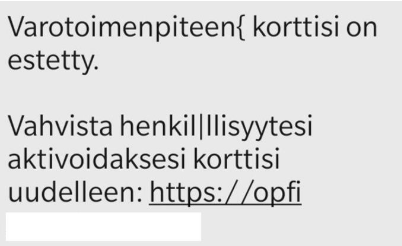Cybercriminals send phishing messages again in our name. At the moment, especially the following types of messages are spreading:
- a message requesting that you read a confidential email through Securemail. There are two types of messages referring to a confidential email. Please note that we will always inform you in advance about sending you a Securemail message.
- a message urging you to activate a mobile bank app. There have been two types of fake messages that urge you to activate a mobile app.
- a message requesting you to read an important message.
The fake messages look like this:
If you get such a message, don’t click on the link in the message.
If you suspect that your user ID has fallen into the wrong hands, deactivate your user ID by calling at 0100 0500 (personal customers) or 0100 05151 (corporate customers). When our Customer Service is not available, please call the OP Deactivation Service at +358 100 0555. It is available 24/7. Be sure to also call our Customer Service during service hours to report the incident.
This is how our messages differ from phishing messages
We never send you messages with a link to the bank’s login page. The bank will never ask you about your user ID or card details through messages Such messages are scams and you should not click on the links in the messages.
Not even for receiving or cancelling a payment, you don’t need to log in via the link, confirm with codes or give your data. If you are asked to act in this way, contact the bank’s Customer Service.
Messages sent by the fraudsters may in your phone end up in the same thread with real messages. The content of phishing messages may vary quickly.
The phishing messages circulated previously have looked like this:

Please remember these seven things when you do banking online
- Do not go to an online bank through the link you have received or a search engine. The message directing you to the login page is scam. You may end up in a scam website through Google, Bing or another search engine too, so type the address on the browser’s address bar.
- Check the address. Always ensure that you are at www.op.fi. Do not enter your identifiers into a site if you are not sure about its legitimacy.
- Keep the identifiers to yourself. A bank or the authorities will never ask you to provide your user ID over the phone or by SMS or email.
- Do not open attachments sent in the name of the bank. Make sure with your bank’s customer service that the attachments are genuine.
- If anyone whose contact you have not expected asks you to install software in your device, do not do that. Install yourself the software you need through an app store of your device.
- Do not confirm any transactions that you do not recognise or are not aware of doing at that very moment. Always read the confirmation requests with due care – if there is anything that does not match, do not confirm anything.
- Please ask in the case of confusion. If the contact or message is suspicious, please contact your own bank before you do anything else.